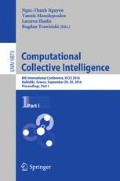Abstract
The emotional state of an individual is continuously affected by daily events. Stressful periods can be coped with by support from a person’s social environment. Support can for example reduce stress and social disengagement. Before improvements on the process of support are however made, it is essential to understand the actual real world process. In this paper a computational model of a network for mutual support is presented. The dynamic model quantifies the change in the network over time of stressors and support. The model predicts that more support is provided when more stress is experienced and when more people are capable of support. Moreover, the model is able to distinguish personal characteristics. The model behaves according to predictions and is evaluated by simulation experiments and mathematical analysis. The proposed model can be important in development of a software agent which aims to improve coping with stress through social connections.
Access this chapter
Tax calculation will be finalised at checkout
Purchases are for personal use only
References
Anderson, N.B.: Encyclopedia of Health and Behavior, vol. 1. Sage (2004)
Aziz, A.A., Ahmad, F.: A Multi-agent model for supporting exchange dynamics in social support networks during stress. In: Imamura, K., Usui, S., Shirao, T., Kasamatsu, T., Schwabe, L., Zhong, N. (eds.) BHI 2013. LNCS, vol. 8211, pp. 103–114. Springer, Heidelberg (2013)
Aziz, A., Klein, M.C.A., Treur, J.: Intelligent configuration of social support networks around depressed persons. In: Peleg, M., Lavrač, N., Combi, C. (eds.) AIME 2011. LNCS, vol. 6747, pp. 24–34. Springer, Heidelberg (2011)
Aziz, A.A., Treur, J.: Modelling dynamics of social support networks for mutual support in coping with stress. In: Nguyen, N.T., Katarzyniak, R.P., Janiak, A. (eds.) New Challenges in Computational Collective Intelligence. SCI, vol. 244, pp. 167–179. Springer, Heidelberg (2009)
Bosse, T., Hoogendoorn, M., Klein, M.C.A., Treur, J.: A generic agent architecture for human-aware ambient computing. In: Mangina, E., Carbo, J., Molina, J.M. (eds.) Agent-Based Ubiquitous Computing, pp. 35–62. Atlantis Press, World Scientific Publishers (2009)
Bosse, T., Memom, Z.A., Treur, J., Umair, M.: An adaptive human-aware software agent supporting attention-demanding tasks. In: Yang, J.-J., Yokoo, M., Ito, T., Jin, Z., Scerri, P. (eds.) PRIMA 2009. LNCS, vol. 5925, pp. 292–307. Springer, Heidelberg (2009)
Bosse, T., Memon, Z.A., Oorburg, R., Treur, J., Umair, M., de Vos, M.: A software environment for an adaptive human-aware software agent supporting attention-demanding tasks. J. AI Tools 20, 819–846 (2011)
Ditzen, B., Heinrichs, M.: Psychobiology of social support: the social dimension of stress buffering. Restor. Neurol. Neurosci. 32, 149–162 (2014)
Pantic, M., Pentland, A., Nijholt, A., Huang, T.S.: Human computing and machine understanding of human behavior: a survey. In: Huang, T.S., Nijholt, A., Pantic, M., Pentland, A. (eds.) ICMI/IJCAI Workshops 2007. LNCS (LNAI), vol. 4451, pp. 47–71. Springer, Heidelberg (2007)
Pentland, A.: Socially aware computation and communication. IEEE Comput. 38, 33–40 (2005)
Schalkwijk, F.J., Blessinga, A., Willemen, A., Van Der Werf, Y.D., Schuengel, C.: Social support moderates the effects of stress on sleep in adolescents. J. Sleep Res. 24, 407–413 (2015)
Schwarzer, R., Bowler, R., Cone, J.: Social integration buffers stress in New York police after the 9/11 terrorist attack. Anxiety, Stress & Coping 27(1), 18–26 (2014)
Smith, A., Wang, Z.: Hypothalamic oxytocin mediates social buffering of the stress response. Biol. Psychiatry 76(4), 281–288 (2014)
Stein, E., Smith, B.: Social support attenuates the harmful effects of stress in healthy adult women. Soc. Sci. Med. 146, 129–136 (2015)
Treur, J.: On human aspects in ambient intelligence. In: Muehlhauser, M., Ferscha, A., Aitenbichler, E. (eds.) AmI 2007 Workshops. CCIS, vol. 11, pp. 262–267. Springer, Heidelberg (2008)
Treur, J.: Dynamic modeling based on a temporal–causal network modeling approach. Biologically Inspired Cogn. Architect. 16, 131–168 (2016)
Acknowledgements
The authors would like to state that Lenin Medeiros' stay at Vrije Universtiteit Amsterdam was funded by the Brazilian Science without Borders program. This work was performed with the support from CNPq, National Council for Scientific and Technological Development - Brazil, through a scholarship which reference number is 235134/2014-7.
Author information
Authors and Affiliations
Corresponding author
Editor information
Editors and Affiliations
Rights and permissions
Copyright information
© 2016 Springer International Publishing Switzerland
About this paper
Cite this paper
Medeiros, L., Sikkes, R., Treur, J. (2016). Modelling a Mutual Support Network for Coping with Stress. In: Nguyen, NT., Iliadis, L., Manolopoulos, Y., Trawiński, B. (eds) Computational Collective Intelligence. ICCCI 2016. Lecture Notes in Computer Science(), vol 9875. Springer, Cham. https://doi.org/10.1007/978-3-319-45243-2_6
Download citation
DOI: https://doi.org/10.1007/978-3-319-45243-2_6
Published:
Publisher Name: Springer, Cham
Print ISBN: 978-3-319-45242-5
Online ISBN: 978-3-319-45243-2
eBook Packages: Computer ScienceComputer Science (R0)

